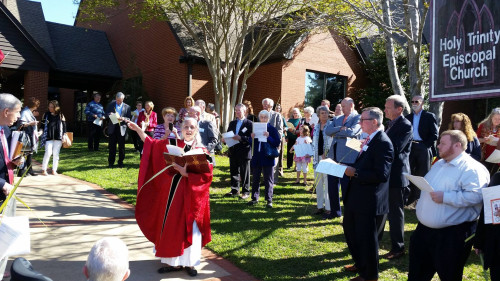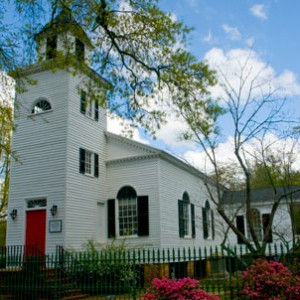"My personal theology is, what has been given by God is not given to us—it's given through us, to the world and the church, to be used for God's purposes."

With the reopening of Hamilton Hall in late September, the School of Theology community moved into a completely revamped space—new areas for studying, prayer, and fellowship; new, state-of-the-art classrooms; a new oratory and preaching forum; even new plumbing and electricity. If seminarians notice a few stray lines on the walls, though, the Rev. Suz Lowe Cate, C’84, T’12, jokes that she may be the culprit. She says she loved her seminary experience so much, “There are probably still claw marks from when I had to leave.”
In honor of their time on the Mountain, Suz and her husband, Will Cate, C’82, have contributed to School of Theology scholarship funding for over a decade. Recently, she reached out to her seminary classmates to encourage gifts toward a Class of 2012 study carrel. The Rev. Casey Perkins, T’22, the School of Theology’s director of development, explains that the carrels are a new naming opportunity. “We’re fortunate to now have 45 beautiful new carrels in Hamilton Hall, and any individual or group can dedicate one for a gift of $6,000,” he says. “This is a great opportunity for a class of alumni, a parish, or other friends of the School of Theology to become part of the seminary’s legacy.”
Cate’s connection to Sewanee dates back almost to her childhood. Growing up in Chattanooga, she knew about the University through word of mouth. She first visited the campus as a high school sophomore, at the recommendation of one of her mother’s friends. “[The friend] said, ‘I think you would really flourish there, and you would love it,’” Cate recalls.

This prediction proved accurate, though Cate’s undergraduate career took a turn during her sophomore year. At the time, she and Will were dating, and Will’s parents decided he would transfer from Sewanee to Florida State University (FSU). “I’m going to claim responsibility for being a great distraction for him,” Suz admits. She followed him to FSU a semester later, and they married soon after her graduation. Despite this transition, Suz says she and Will still hold Sewanee close as an alma mater. “Even though neither of us graduated from [the College], Sewanee has always been an important place for us,” she notes. “It’s the place where the deepest friendships of our lives were formed.”
Cate’s return to Sewanee as a seminarian might seem unsurprising, considering her affection for the Domain—yet, she describes herself as a relative latecomer to the Episcopal Church. “My family left the Church when I was about eight years old, and I did not return, really, for 30 years.” Cate says her parents chose to step away from organized religion after encountering racial prejudice in their parish. “My mother was one of the first full-time white faculty members at Howard High School in Chattanooga, and she brought [a Black] coworker to church with her. That caused an issue,” she says, adding, “I think their priest was very supportive of them, but the rest of the congregation wasn’t quite ready for that.”
Cate credits her older son, William, for re-introducing her to the Episcopal faith. In the late 1990s, the family moved to Russellville, Arkansas, and William started attending Camp Mitchell, a nearby Episcopal youth camp, during summer breaks. “One summer, we went to pick him up, and William looked at me and said, ‘You know, this Camp Mitchell stuff is really great. We should be going to church to learn the culture.’” That Sunday, the Cates went to a service at All Saints’ Episcopal Church in Russellville. “We were home,” Suz says. “It was probably about nine years between that [Sunday] and the point of entering a formal discernment process for the priesthood.”

In 2003, the Cates left Russellville for Murfreesboro, Tennessee, so they could live closer to Suz’s family—”and to Sewanee,” she says. While singing in the choir at St. Paul’s Episcopal Church in Murfreesboro, she felt a tap on her shoulder. “I was like, ‘There’s nobody back there — what is that?’” Sensing a call to ministry, she met with the Rev. Gene Wise, who was then the rector of St. Paul’s. “I said, ‘I think I might be called to serve as a deacon,’” she says. “He said, ‘Kid, you’re going to be a priest.’”
Six years later, the Cates found themselves again living on the Mountain. “I’m a huge proponent of residential formation when it’s feasible,” Suz says. “There’s really nothing that can replace the experience of worshiping with the people who are teaching you and being led in worship by the same people.” She adds that she particularly appreciated the opportunity “to see a variety of women at the altar,” which can be an infrequent occurrence outside of the residential seminary setting.
Coincidentally, Cate’s matriculation at the School of Theology coincided with the hiring of three seminary professors: Professor of Classics and Ancient Christianity Dr. Paul Holloway, P’15, P’18, P’25; Associate Professor of Theology the Rev. Dr. Robert MacSwain; and former Professor of Christian History and Associate Dean of Academic Affairs the Rev. Dr. Benjamin King. “I loved learning with all of them,” Cate says. Another highlight of her seminary experience, she says, was participating in courses taught by Bishop Frank A. Juhan Professor of Pastoral Theology the Rev. Dr. Julia Gatta. “Mother Julia is the voice I hear in the back of my head whenever I go on a pastoral visit,” Cate says. “During that moment when I’m sitting in my car, before I get out to walk into the home or hospital or hospice center, I hear Mother Julia say, ‘Stop and pray. Remember, your first job is to love them, and it’s not about you.’”

Cate gained practice ministering in challenging settings during her three months of Clinical Pastoral Education (CPE) at Erlanger Baroness Hospital in Chattanooga. “I was assigned to the NICU and the high-risk pregnancy unit,” she says. “Some of the babies were very, very premature, and I couldn’t touch them or make a physical connection with them.” Despite this obstacle, Cate says, “That was where I learned how to be a pastor—because I had to find a way to provide spiritual care for those children in that really difficult situation.” After several days of struggling to find her purpose, Cate decided to pray next to one of the bassinets. “And then I went to every single bassinet and prayed. When it was possible, I prayed with the nurses.”
Cate is now rector of Holy Trinity Episcopal Church in Clemson, South Carolina, which is located on the campus of Clemson University. As part of her role, she is also headmaster of Holy Trinity Episcopal Day School, the pre-K school affiliated with the parish. “I have the great joy of walking down the [school] hallway, or walking by the playground, and hearing, ‘Mother Suz! Mother Suz!’” The church’s ministry includes a broad range of community outreach, and during her tenure, Cate has been especially involved with expanding Holy Trinity’s So All May Eat (SAME) Garden. “Last year, we gave away 500 pounds of fresh produce to the local food bank,” she says, “and we’re on track to do about the same this year.”
On the first Sunday of each month, Cate holds services at St. Paul’s Episcopal Church in Pendleton, South Carolina, a 200-year-old parish over which Holy Trinity Episcopal Church has custodial care. In 2019, she began researching the history of African American presence at St. Paul’s, encouraged by summer coursework at the School of Theology. Over time, she developed a collaboration with the Pendleton Foundation for Black History and Culture. “The president of that organization, Terence Hassan, is a descendant of [an African American] person who was married by St. Paul’s clergy in the 1870s,” she says.

Through meetings with Hassan, Cate learned more about his St. Paul’s-affiliated ancestor, Martha Burt. “He said, ‘My Great-Aunt Martha used to tell my grandmother a story about walking down the street holding her mother’s hand. She looked up, and her mother said, ‘Martha, we’re free now.’ Martha replied, ‘Well, what does that mean, Mama? What are we going to do? Where are we going to go?’ And her mother said, ‘I don’t know, but we’re free.’” Cate says Hassan’s story gave both of them goosebumps, and it has motivated her to continue exploring and amplifying St. Paul’s African American past.
Though her schedule stays busy, Cate says she visits Sewanee as often as she can. In past years, she has served as a University trustee and on the School of Theology’s alumni council. She describes her Sewanee philanthropy as grounded in her religious beliefs. “My personal theology is, what has been given by God is not given to us—it’s given through us, to the world and the church, to be used for God’s purposes.” Sewanee’s seminary, she adds, “occupies a very special, unique place in the Episcopal Church, and I want to see it continue to thrive and to offer the experiences that have formed me to more generations of people who are preparing for ministry.”

